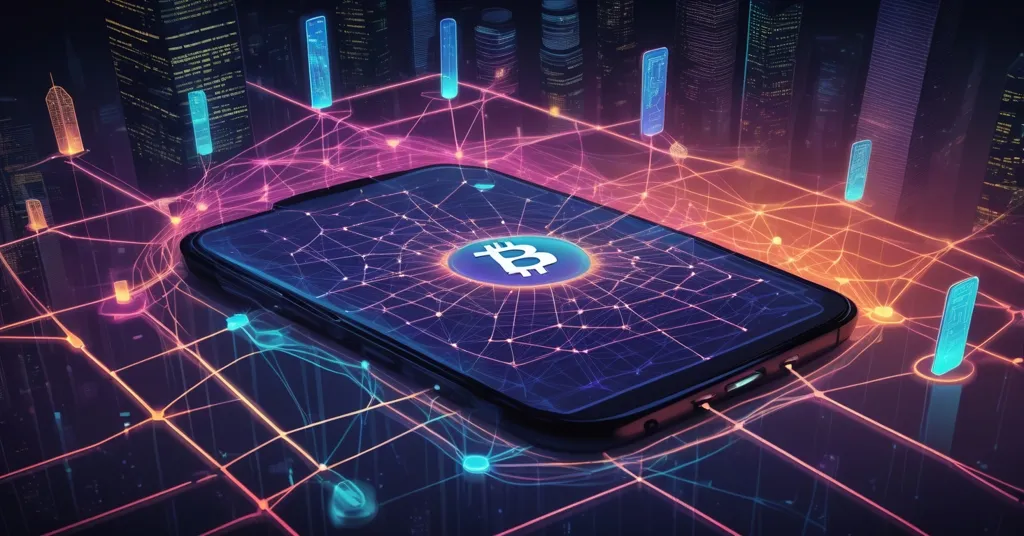Overnode: Stephan February’s Bitcoin P2P Mobile App to Challenge Big Tech’s Grip

Overnode: Stephan February’s Bold Bitcoin P2P Vision for a Decentralized Mobile Future
Stephan February, a seasoned coder and Bitcoin SV (BSV) builder, is taking a sledgehammer to the centralized internet with his latest project, Overnode. Unveiled during a candid chat on the CoinGeek Weekly Livestream with host Kurt Wuckert Jr., Overnode promises a mobile app that’s not just another wallet, but a gateway to a true peer-to-peer (P2P) network—rooted in Bitcoin’s ethos of decentralization and user sovereignty.
- Core Idea: Overnode is a native mobile app with a built-in wallet, running on its own P2P network while linked to the Bitcoin SV blockchain.
- Big Goal: Ditches centralized servers for a local-first, serverless setup, aiming to reclaim user control from Big Tech’s grip.
- Key Challenge: Faces steep adoption barriers against the entrenched, convenience-driven centralized apps dominating today’s digital space.
Overnode’s Core Features: A Serverless Revolution
At its heart, Overnode isn’t trying to be just another crypto wallet, though it has one seamlessly integrated. As Stephan February explains in his discussion on P2P networks, it’s much more than that:
“Overnode is not a wallet, but it has a wallet built into it.”
This mobile app operates on its own P2P mobile network, meaning users connect directly with each other rather than through some corporate server farm. It also ties into the Bitcoin SV blockchain—a fork of Bitcoin that prioritizes scalability with larger block sizes, handling over 5,000 transactions per second at fees as low as $0.0000005. For the uninitiated, BSV’s design makes tiny, frequent payments (micropayments) dirt cheap and practical, a cornerstone of Overnode’s vision.
One standout feature is its support for Simplified Payment Verification, or SPV. Think of SPV as a lightweight way to confirm Bitcoin transactions without needing the computing muscle of a full node—imagine verifying a payment as easily as checking a text message on your phone. Beyond that, Overnode enables what February calls “arbitrary data exchange,” allowing users to send files, messages, or any data directly between devices, independent of Bitcoin’s infrastructure. It’s like swapping notes in class without the teacher—or in this case, a cloud service like Google Drive—snooping over your shoulder. This serverless P2P approach with its unique challenges and benefits stores data on users’ devices, slashing reliance on centralized hubs that often monetize your every move.
The Fight Against Platform Dystopia
February’s rebellion isn’t just technical; it’s deeply personal. He’s fed up with what he dubs “platform dystopia”—a digital cage where giants like Facebook and Google broker every human interaction, harvesting data for profit while users get scraps of privacy. As noted during the livestream discussion:
“He doesn’t like how the Internet has evolved over time, and he doesn’t like how human interactions are brokered by web browsers and social media platforms.”
Big Tech’s got us on a leash, and Overnode is February’s attempt to cut the cord. He envisions it becoming as essential as Twitter, Slack, or Telegram, a digital town square where users trade ideas and value without a corporate overseer. It’s a nostalgic nod to the early internet of the late ‘90s and early 2000s, when P2P networks like those foundational to Bitcoin SV thrived on raw community spirit. Host Kurt Wuckert Jr. tied this to Bitcoin’s roots, pointing out that Overnode echoes Satoshi Nakamoto’s original vision of direct, IP-based transactions with no middlemen—a cypherpunk dream updated for the mobile age.
But let’s not get misty-eyed. Building a Bitcoin P2P future that rivals today’s polished, addictive apps is a colossal task. Convenience often trumps ideology, and most users don’t lose sleep over privacy when Instagram’s dopamine hits are just a swipe away. Still, for those who crave control over their digital lives, Overnode’s serverless blockchain technology offers a tantalizing glimpse of what could be.
Micropayments as Social Fuel
One of Overnode’s most intriguing hooks is its use of micropayments to grease the wheels of social and network interactions. Thanks to BSV’s scalability—over 3.5 billion transactions processed to date—these are transactions costing fractions of a cent. February shared a glimpse of the potential, as detailed in discussions on BSV micropayments within P2P applications:
“With [micropayments], we can financially incentivize hosting, connecting, sharing, etc; you can get paid for people moving, storing, and sharing data in the network.”
Picture this: you’re in a digital “Space,” like a chaotic online forum, and for a measly 0.1 BSV (pennies at current rates), you can take the mic—prioritize your message or mute a troll. Or pay a small fee to enter an invite-only area, ensuring only committed folks join. It’s not just social flexing; it’s a circular data economy. Unlike old-school torrent networks where sharing was a labor of love, Overnode rewards users for hosting data, connecting others, or moving bytes across the network.
Yet, let’s play devil’s advocate here. Could this pay-to-play model turn digital spaces into elitist echo chambers where the loudest voices are just the deepest pockets? And what’s to stop spam or abuse when every action has a price tag? Micropayments might fuel engagement, but they could also breed inequality or annoyance if not tightly managed. February’s betting on financial incentives to drive a healthier network than altruism ever did, but the jury’s out on whether users will bite.
Privacy and Regulatory Risks: Walking the Tightrope
Privacy is Overnode’s selling point, but it’s also its Achilles’ heel. Direct user-to-user networks, by design, can become digital Wild Wests—think Napster’s legal battles over file sharing or Bitcoin’s early ties to Silk Road’s black markets. For deeper insights into how Overnode impacts privacy on Bitcoin SV, the debate is ongoing. February isn’t blind to this, stating frankly:
“I only care to the extent that I don’t want it to be used to harm people.”
His solution isn’t to play censor but to focus on harm reduction. Ideas like curated, safe marketplaces within Overnode aim to nudge users away from illicit corners without choking their freedom. Details are thin, though, and that’s a red flag. How do you define “safe” without morphing into the centralized authority you despise? And let’s not ignore the regulatory landmines. P2P setups have historically drawn heat from lawmakers, and while BSV claims compliance with current rules, Overnode’s privacy-first, serverless design could still catch unwanted attention. Governments aren’t exactly fans of tools that make oversight tricky.
Then there’s the ethical dilemma for users. Sure, decentralization empowers, but it also hands responsibility to individuals who might stumble into grey areas—intentionally or not. Balancing liberty with accountability is a tightrope, and February’s harm reduction tools will need to be damn robust to keep Overnode from becoming a liability.
Can Overnode Scale? Adoption and Technical Hurdles
Beyond ethics, Overnode faces practical obstacles that could make or break its Bitcoin decentralization dream. First, there’s the adoption conundrum. Why would the average user ditch familiar, frictionless apps for a P2P alternative, even one with privacy perks? Psychological comfort and sheer laziness often outweigh ideological appeal. BSV’s active community—hosting events and meetups—might give Overnode a grassroots boost, with recent updates on BSV integration and app development showing promise, but scaling to mainstream relevance is a brutal climb.
Then there’s the technical reliability of a serverless network. How does data persist if users go offline? In a centralized app, servers keep things humming 24/7. In Overnode’s P2P model, if too few participants are active to host or relay data, the network could grind to a halt. Think of it like a potluck—if not enough folks bring dishes, everyone goes hungry. February hasn’t detailed fallback mechanisms, though parallels to tech like IPFS (a decentralized file system) suggest solutions might involve incentivizing constant participation. Still, it’s a gamble.
Lastly, BSV’s own baggage could weigh Overnode down. Despite its scalability strengths, BSV carries a controversial rep in the crypto world, tied to centralization critiques and debates around figures like Craig Wright. For Bitcoin maximalists who swear by BTC, or altcoin fans eyeing Ethereum’s dApps, Overnode’s BSV foundation might be a turnoff. Credibility matters as much as code in this space.
Overnode in the Crypto Landscape: A Niche or a New Frontier?
Zooming out, Overnode isn’t just a standalone app; it’s a piece of the broader blockchain privacy puzzle. Compared to Ethereum-based decentralized apps (dApps) that often rely on complex smart contracts, Overnode’s simplicity and BSV-backed micropayments carve a unique niche. It also differs from privacy-focused tools like Signal, which prioritize encryption over financial incentives. Even BitTorrent, a P2P veteran, lacks the blockchain integration that makes Overnode’s data economy tick, as explored in conversations around decentralized mobile apps like Overnode.
Yet, could its concepts apply beyond BSV? Bitcoin (BTC) purists might scoff at BSV’s fork history, but Overnode’s P2P vision theoretically aligns with BTC’s core if fees weren’t a barrier. Other chains like Litecoin or even Ethereum’s layer-2 solutions could adapt similar serverless ideas, though each has trade-offs in cost or complexity. February’s project spotlights a gap—true P2P mobile apps—that Bitcoin and altcoins alike could fill, each with their strengths. It’s not about picking a winner; it’s about proving decentralization can work at street level.
Ultimately, Overnode’s a gutsy experiment. It’s a throwback to cypherpunk ideals, turbocharged by blockchain’s financial punch. We’re cheering for a P2P revival that shakes Big Tech’s foundations, but with eyes wide open to the rocky road ahead. Could Overnode spark a movement, or is the centralized grip too tight to break?
Key Takeaways and Questions on Overnode
- What is Overnode, and how does it connect to Bitcoin?
Overnode is a mobile app with an integrated wallet, operating on its own P2P network while leveraging the Bitcoin SV blockchain for transactions and validation through SPV, embodying Bitcoin decentralization at its core. - How does Overnode challenge the centralized internet model?
By embracing a local-first, serverless setup, it eliminates middlemen like social media platforms, aiming to restore user control over data and interactions in a privacy-first approach. - What practical uses do micropayments enable in Overnode?
Micropayments allow actions like paying tiny fees to lead social conversations, access exclusive digital spaces, or compensate network participants for sharing and hosting data. - How does Overnode address risks of misuse in its P2P network?
Stephan February proposes harm reduction via curated marketplaces to steer users from illicit activities, though specifics on implementation remain unclear, raising questions about effectiveness. - Is Overnode’s decentralized vision feasible in today’s digital world?
It’s ambitious, with BSV’s scalability offering a strong base, but adoption hurdles, technical reliability, and regulatory scrutiny pose significant challenges against dominant centralized platforms.



